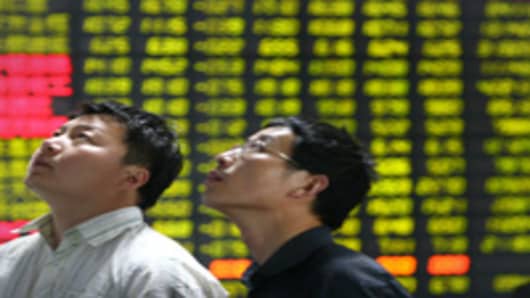China’s battered stock market has slumped to its lowest level in 3-1/2 years this week and the selling appears to be relentless, but analysts tell CNBC that Chinese shares are not on the verge of a 2008-style market collapse.
The recent fall in Chinese equities is driven by weakness in the economy and poor corporate earnings growth, but does not yet suggest that investors are in panic mode, say analysts.
“I don’t think the move in the Chinese stock market is that out of the ordinary,” said Alistair Chan, Economist at Moody’s Analytics in Sydney. “If you look at the market’s performance historically, it’s not that bad.”
China’s Shanghai Composite Stock Index has shed 15 percent in the past three months and is down more than 6 percent year-to-date, making it Asia’s worst performing major stock market this year. It has also lagged its global peers such as the S&P 500, which is up more than 12 percent.
Market sentiment this week was hit by disappointing corporate earnings, especially from Chinese banks, which have seen a slowdown in profit growth. First-half earnings this year have been the worst for Chinese companies in three years.
Plus property stocks have been hurt by local news reports of further measures to cool the sector.
Not as Bad as 2008
While China’s stock market performance is poor, when you compare it to 2008 it does not look so dismal. In 2008, at the height of the global financial crisis, the Shanghai Composite tanked about 50 percent between June and November to 1,719.
Billionaire investor Jim Rogers says, “China’s stock market is not at a level where you can say it is collapsing. November 2008 – that was a collapse. China has been trying for three years to cool its economy, so in that context the decline in the stock market should not be a surprise.”
Equity analysts say that while further weakness in China’s equity market could be expected in the near-term, the index was unlikely to head below the 2,000 level.
They point out that China’s stock market has been in a steady decline rather than falling sharply and quickly – as it did in 2008 – because the slowdown in China’s economywas expected after the rapid growth of recent years.
“What we are going through in China is a cyclical slowdown and this together with the global slowdown is now being reflected in the Chinese stock market,” said Rob Aspin, Head of Equity Strategy at Standard Chartered Wealth Management Group in Singapore, adding that he remains positive on the outlook for Chinese shares long-term.
A poll released on Friday by Reuters showed that Chinese fund managers in August cut their recommended equity weightings to the lowest level in more than two years on concerns about further economic weakness.
Hoping for Stimulus
Analysts said that any monetary or fiscal stimulus from Beijing would help boost sentiment towards Chinese shares but added that investors could not bet on those measures coming through in the near future.
Despite a slew of weak economic numbers, China’s policymakers are treading carefully, fearful of repeating the mistakes of four years ago. In 2008-2009, the government announced spending worth $586 billion or 14 percent of GDP, to bolster China’s economy in the face of a global financial crisis, but that spending has subsequently been blamed for creating overcapacity and fuelling inflation.
“Because of a fear of overreacting, Chinese policymakers have been under reacting to the slowdown,” said Alistair Thornton, Senior China Economist at HIS. “We could see economic measures but it won’t be the same as 2008-09.”
China has eased monetary policy by slashing reserve requirement ratios for banks three times since last November. The Chinese central bank has also lowered interest rates twice this year to boost an economy, which grew at its slowest pace in more than three years in the second quarter.
- By CNBC's Dhara Ranasinghe


